Can Rabbits Eat Parsley?
This page contains affiliate links. We may earn money or products from the companies mentioned in this post through our independently chosen links, which earn us a commission. Learn More
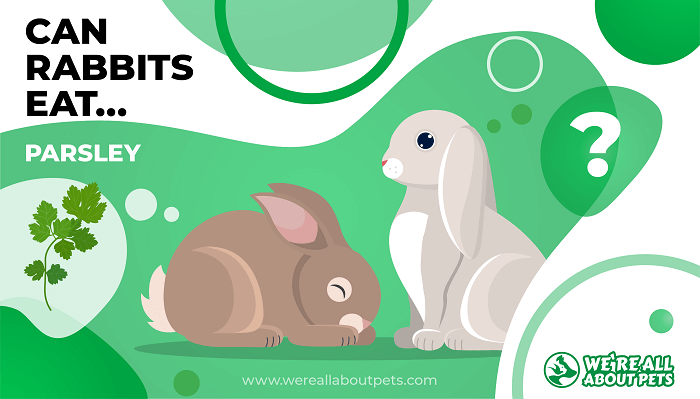
We love it in salad, soup, and as an essential ingredient in lots of savory recipes. Parsley is healthy – and it’s a staple in our spice cabinets as well as our herb gardens! But is Parsley something we can share with our pets?
The quick answer is “Yes! rabbits can have parsley.”
But there are some things you should know before you hop into the kitchen or head for the garden. Keep reading and soon you’ll know all the facts about parsley for rabbits.
Parsley Nutrition Stats
Parsley isn’t something we normally eat lots of, but perhaps we ought to have more!
One cup of fresh parsley provides:
- 5 calories
- 8 g carbohydrates
- 2 g fiber
- 8 g protein
- .5 g fat
Parsley Nutritional Facts

Even though parsley is often an afterthought or garnish, it’s full of vitamins, minerals, and antioxidants that are good for you and your bunny!
That same one-cup serving of parsley gives you approximately:
- 984 mcg vitamin K
- 8 mg vitamin C
- 5055 IU vitamin A
- 7 mg iron
- 91 mcg folate
- 332 mg potassium
- 8 mg calcium
- .1 mg manganese
- 30 mg magnesium
Parsley also contain traces of phosphorus, copper, and zinc, along with vitamins E and B6.
Can Rabbits Have Parsley?
Yes! Most rabbits can have parsley.
Notice we said “most.”
If your rabbit has a history of urinary problems such as sludge, or if they have a history of kidney stones, parsley probably isn’t a good choice due to its high calcium content.
In case you’re on the fence about whether you should give your rabbit parsley or not, ask your vet for an opinion! They know your bunny’s health history and can provide you with a reliable answer.
Is Parsley Good For Rabbits?
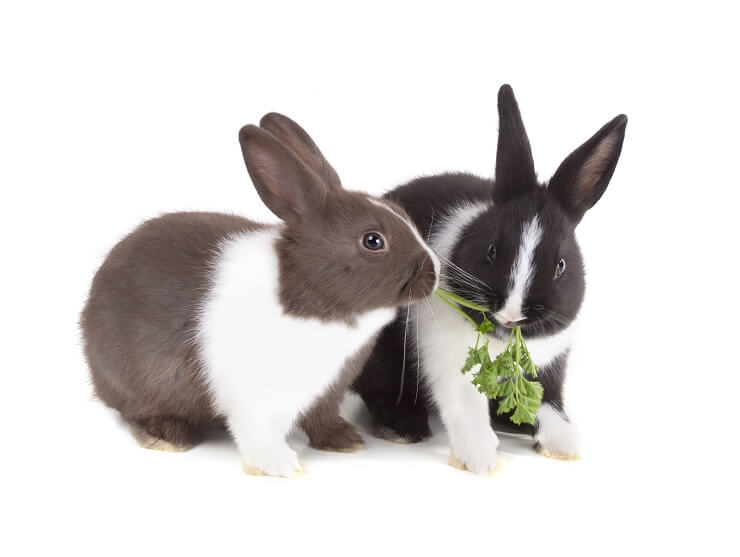
Yes, parsley is good for most rabbits! Of course, you’ll want to stick with the proper amount and you’ll definitely want to give your bunny’s parsley a good washing up before you bring it to their hutch.
Do Rabbits Like Parsley?
Most rabbits love the taste of parsley and eagerly nibble away.
How Much Parsley Can A Rabbit Eat?
Your bunny will probably like this answer quite a bit. Here’s how much parsley to feed your rabbit:
| Age | Amount |
| Baby rabbits | None |
| Juvenile rabbits | None |
| Adult rabbits | 2 stems of parsley with leaves |
If your rabbit is already eating fresh foods, go ahead and offer them the full serving size. In case this is the first fresh treat you’re giving them, offer just one stem for now.
Over the next several hours, watch for signs of digestive discomfort, bloating, or diarrhea. While parsley isn’t likely to cause any problems, it’s important to keep an eye out for trouble every time you offer your bunny something new.
So long as everything goes well, you can continue to give your rabbit parsley. It’s low in sugar, high in fiber, and very, very yummy, so your bunny will probably appreciate it!
How Often Can A Rabbit Eat Parsley?
Your rabbit can eat a little bit of parsley each day after they’ve become accustomed to it, unless you’re offering other foods that are relatively high in calcium.
Just remember that variety is important. It’s best to offer your rabbit a variety of natural treats so they get the best nutrition possible and reduce their risk of suffering from health problems!
The Correct Diet Is Important
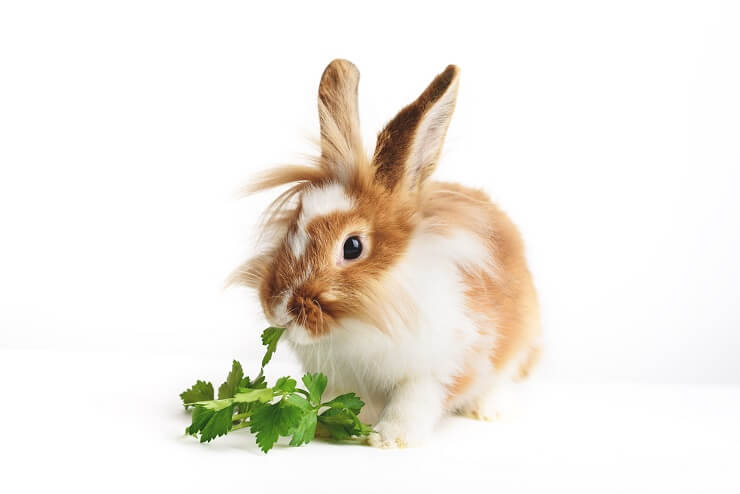
You might be wondering what a rabbit’s natural diet looks like.
In the wild, rabbits happily nibble at little plants and grasses for hours on end, along with whatever goodies they happen to find. Wild berries, garden vegetables, and even certain flowers are special treats.
It’s safe to say that if a wild bunny found parsley growing, they’d enjoy it and return in hopes of finding more!
Your bunny’s diet should look similar to the one a wild rabbit eats. Of course, your rabbit isn’t able to run free and nibble – that simply wouldn’t be safe.
So it’s up to you to provide a diet consisting mostly of specific plants that keep your rabbit’s digestive system running while promoting overall wellbeing.
Here’s what to feed your rabbit every day.
- Fresh hay is the mainstay of your rabbit’s diet since it’s essentially dried grasses. Varieties like Timothy, oat, and orchard are best. Give your bunny an unlimited amount of hay and don’t worry if some of it ends up mixed with their bedding. Your bunny needs to nibble constantly and hay ensures that this is possible.
- Next, offer a serving of high-quality rabbit food. The label will tell you exactly how much to feed your bunny based on their age and weight.
- Fresh veggies are wonderful treats that your bunny will look forward to having each day – and they’ll make life more exciting, too! Each day, your rabbit can have about one cup of leafy greens plus a tablespoon of crunchy veggies per two pounds of bunny body weight.
- You can give your bunny 1 teaspoon of fruit per 2 pounds of body weight, if you like. This is simply a baseline. You should research each fruit to make sure it’s safe and find the correct serving size!
There are two more things your rabbit needs for good health.
- An unlimited supply of clean, fresh water; rinse and refill your rabbit’s water bottle at least once each day.
- 24/7 access to chewable rabbit toys such as apple wood sticks, pieces of unbleached loofah, or chunks of coconut shell. Don’t skip these since constant chewing helps keep your rabbit’s teeth at the right length.
What Are Other Healthy Alternatives To Parsley In A Rabbit’s Diet?
Rabbits like all kinds of herbs, vegetables, and fruits.
Next time you’re looking for a fun treat for your bunny, you might consider trying:
- basil
- cilantro
- carrot tops
- swiss chard
- beet greens
- radish tops
- spinach
- arugula
- romaine lettuce
- butter lettuce
- cabbage
- broccoli
- dandelion greens
- blueberry
- strawberry
- apple
- broccolini
- blackberry
- raspberry
- banana
- endive
- escarole
- fennel
- bok choy
- yu choy
- kale
- carrots
- bell peppers
It’s best to rotate through different treats and greens since a compound called oxalate can combine with calcium and build up in the kidneys or increase bladder sludge.
Remember to check with your vet if you think this might be an issue – they’re your first line of defense in ensuring good health for your bunny!
For now though, why not try giving your rabbit parsley? It’s a great way to make life a little more flavorful!
Frequently Asked Questions
Is parsley safe for rabbits?
Yes, Parsley is generally safe for rabbits – in fact, it’s a very healthy food that they can have frequently so long as you offer just a little at a time.
Remember that parsley isn’t ideal for rabbits with a history of kidney or bladder problems since it is high in calcium and this can make matters worse.
Can rabbits have Italian parsley?
Italian parsley is great for rabbits! If your rabbit can have curly parsley, then you can feel free to offer them Italian parsley as well.
Can parsley make my rabbit sick?
Yes, in rare cases, parsley might make your bunny sick. This might happen if your rabbit eats far too much parsley all at once, or if it’s their first fresh food and you forget to introduce it to them slowly.
Over the long term, parsley can contribute to kidney and bladder issues when your rabbit is eating a diet that is too high in calcium and/or oxalates. Be sure to talk with your vet about any concerns you might have.






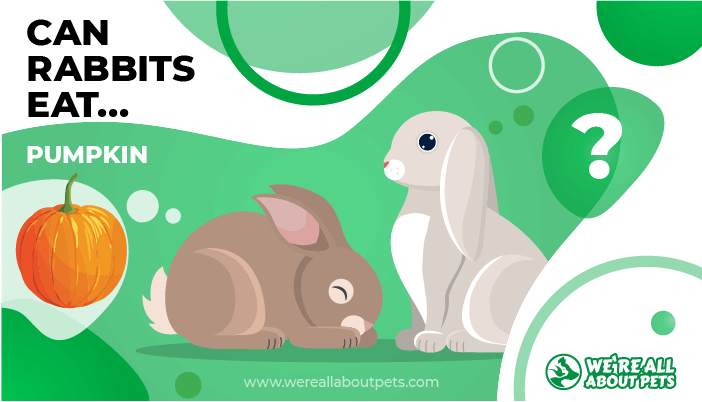
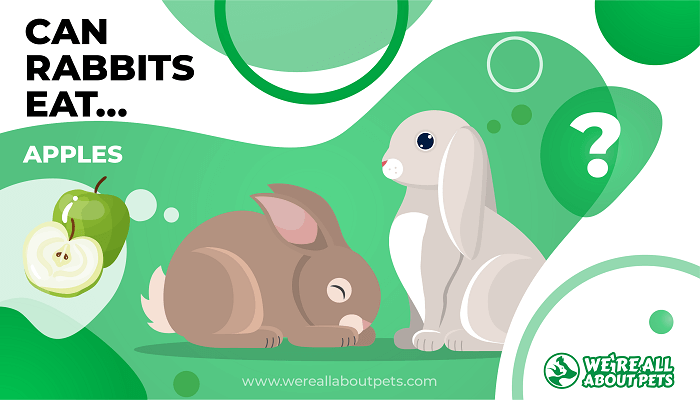
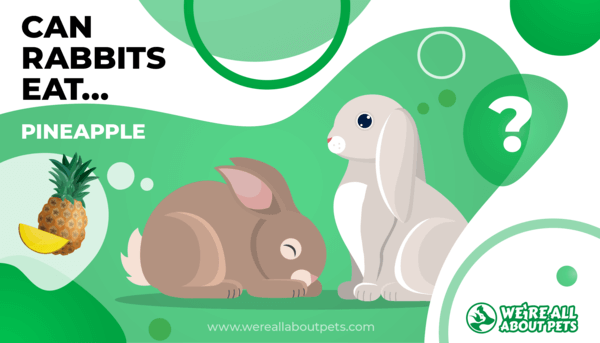
Marian
Thank you, I'm a first time Rabbit friend, stand in care giver.